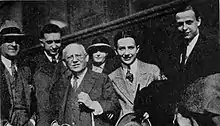E. A. Dupont
Ewald André Dupont (25 December 1891 – 12 December 1956) was a German film director, one of the pioneers of the German film industry. He was often credited as E. A. Dupont.
Ewald André Dupont | |
|---|---|
 Second from left in 1926 group greeting Carl Laemmle in Los Angeles | |
| Born | 25 December 1891 |
| Died | 12 December 1956 (aged 64) |
| Other names | E. A. Dupont |
| Occupation(s) | Film director Screenwriter |
| Years active | 1916–1956 |
Early career
A newspaper columnist in 1916, Dupont became a screenwriter and began directing his own crime-story scripts in 1918. After several successes in his native Germany in silent films, he worked in London and in Hollywood, California. One of his greatest successes was the silent film Varieté (1925). This film, about an ex-trapeze artist, was noted for its innovative camerawork with highly expressive movement through space, accomplished by the expressionist cinematographer Karl Freund.[1] Varieté even did well in the United States, screening for 12 weeks at New York's Rialto Theatre.[2]
United States
Dupont's success was noticed by Carl Laemmle at Universal, who offered Dupont a lucrative contract. His first project was Love Me and the World Is Mine in the early summer of 1926, which ran well over budget ($350,000) and was not a success.
Britain
Dupont then headed to Britain and made the film Piccadilly (1929), a late silent, which is remembered for the central performance of the Chinese-American actress Anna May Wong. Atlantic (also 1929) is a retelling of the Titanic disaster and is seen as one of the most innovative uses of sound film technology available at the time. Dupont made several more films in Britain and a few in Germany and France.
Later career
After a brief return to Germany, the Jewish director emigrated to the United States in 1933, where he was assigned to several B movies and low budget "programmer" films. Unhappy with the lack of opportunities afforded him in Hollywood, Dupont became a talent agent in 1940.[3]
Dupont returned to filmmaking when he wrote and directed The Scarf (1951). In 1952 and 1953, he wrote 23 episodes for the TV series Big Town (1950–56) and directed two of those episodes, "Tape Recorder" (19 June 1952) and "The Story of Jerry Baxter" (1 January 1953). Dupont directed several more low-budget films, such as The Neanderthal Man (1953).
Selected filmography
Director
- Europe, General Delivery (1918)
- Midnight (1918)
- The Devil (1918)
- The Japanese Woman (1919)
- The Secret of the American Docks (1919)
- The Mask (1919)
- The Spies (1919)
- The Apache of Marseilles (1919)
- The Derby (1919)
- Alkohol (co-director: Alfred Lind, 1919)
- World by the Throat (1920)
- The Grand Babylon Hotel (1920)
- The White Peacock (1920)
- Whitechapel (1920)
- Hearts are Trumps (1920)
- Murder Without Cause (1921)
- Children of Darkness (1921)
- The Vulture Wally (1921)
- Kinder der Finsternis (1921)
- She and the Three (1922)
- The Green Manuela (1923)
- The Ancient Law (1923)
- The Humble Man and the Chanteuse (1925)
- Variety (1925)
- Love Me and the World Is Mine (1927)
- Moulin Rouge (1928)
- Piccadilly (1929)
- Atlantic (English-language film, 1929)
- Two Worlds (English-language film, 1930)
- Two Worlds (German-language film, 1930)
- Les deux mondes (French-language film, 1930)
- Menschen im Käfig (German-language film, 1930)
- Le cap perdu (French-language film, 1931)
- Cape Forlorn (English-language film, 1931)
- Salto Mortale (French-language film, 1931)
- Salto Mortale (German-language film, 1931)
- Peter Voss, Thief of Millions (1932)
- The Marathon Runner (1933)
- Ladies Must Love (1933)
- The Bishop Misbehaves (1935)
- Forgotten Faces (1936)
- A Son Comes Home (1936)
- Night of Mystery (1937)
- On Such a Night (1937)
- Love on Toast (1937)
- Hell's Kitchen (1939)
- The Scarf (1951)
- Pictura: An Adventure in Art (1951, co-director)
- Problem Girls (1953)
- The Neanderthal Man (1953)
- The Steel Lady (1953)
- Return to Treasure Island (1954)
Screenwriter
- Vengeance Is Mine (dir. Rudolf Meinert, 1916)
- The Onyx Head (dir. Joe May, 1917)
- Let There Be Light (dir. Richard Oswald, 1917)
- Ferdinand Lassalle (dir. Rudolf Meinert, 1918)
- His Majesty the Hypochondriac (dir. Frederic Zelnik, 1918)
- Alkohol (dir. Alfred Lind, 1919)
- Patience (dir. Felix Basch and Paul Leni, 1920)
- Madame Pompadour (dir. Herbert Wilcox, 1927)
- Magic Fire (dir. William Dieterle, 1955)
- Please Murder Me (dir. Peter Godfrey, 1956)
References
- Kristin Thompson. Youtube commentary for Varieté. https://www.youtube.com/watch?v=X4Tov1vgoVI
- Jan-Christopher Horak. "Sauerkraut and Sausages with a Little Goulash: Germans in Hollywood, 1927." Film History, Vol. 17, No. 2/3, the Year 1927 (2005), pp. 241–260.
- Hal Erickson, Rovi
- St. Pierre, Paul Matthew (May 1, 2010). E. A. Dupont and His Contribution to British Film. Fairleigh Dickinson University Press. ISBN 978-1-61147-433-6.
External links
- E. A. Dupont at IMDb
- E. A. Dupont at the BFI's Screenonline